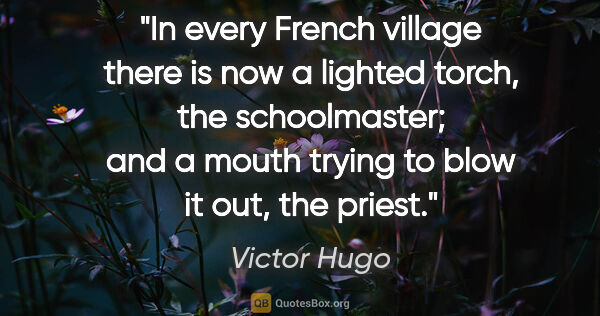Villages Quotes (page 3)
Since we are not yet fully comfortable with the idea that people from the next village are as human as ourselves, it is presumptuous in the extreme to suppose we could ever look at sociable, tool-making creatures who arose from other evolutionary paths and see not beasts but brothers, not rivals by fellow pilgrims journeying to the shrine of intelligence. Yet that is what I see, or yearn to see. The difference between raman and varelse is not in the creature judged but in the creature...
Orson Scott Card
I used to come from the village with all that dirt and coarse ugliness like a pain within me, and the simpering pictures in the drawing-room seemed to me like a wicked attempt to find delight in what is false, while we don't mind how hard the truth is for the neighbors outside our walls. I think we have no right to come forward and urge wider changes for good, until we have tried to alter the evils which lie under our own hands.
George Eliot
the mystic must be steadily told,—All that you say is just as true without the tedious use of that symbol as with it. Let us have a little algebra, instead of this trite rhetoric,—universal signs, instead of these village symbols,—and we shall both be gainers. The history of hierarchies seems to show that all religious error consisted in making the symbol too stark and solid, and was at last nothing but an excess of the organ of language.
Ralph Waldo Emerson
Look, one day I had gone to a little village. An old grandfather of ninety was busy planting an almond tree. ‘What, grandfather!’ I exclaimed. ‘Planting an almond tree?’ And he, bent as he was, turned around and said: ‘My son, I carry on as if I should never die.’ I replied: ‘And I carry on as if I was going to die any minute.’
Which of us was right, boss?
Nikos Kazantzakis
I walked away at a good pace, thinking it was easier to go than I had supposed it would be, and reflecting that it would never have done to have an old shoe thrown after the coach, in sight of all the High Street. I whistled and made nothing of going. But the village was very peaceful and quiet, and the light mists were solemnly rising, as if to show me the world, and I had been so innocent and little there, and all beyond was so unknown and great, that in a moment with a strong heave and...
Charles Dickens
Never wants to what?”
Meet anybody for a drink. Oh, he had to go out last night and meet this television writer for a drink downtown, in the Village and all. That’s what started it. He says the only people he ever really wants to meet for a drink somewhere are all either dead or unavailable. He says he never even wants to have lunch with anybody, even, unless he thinks there’s a good chance it’s going to turn out to be Jesus, the person – or the Buddha, or Hui-neng, or Shankaracharya, or...
J. D. Salinger
Cultural speciation had been crippling to human moral and spiritual growth. It had hindered freedom of thought, limited our thinking, imprisoned us in the cultures into which we had been born. . . . These cultural mind prisons. . . . Cultural speciation was clearly a barrier to world peace. So long as we continued to attach more importance to our own narrow group membership than to the ‘global village’ we would propagate prejudice and ignorance.
Jane Goodall
…in joy he will invariably dance; when he is in love he will dance, for the czardas helps him to explain to the girl he loves exactly what he feels for her. And she understands. One czardas will reveal to a Hungarian village maid the state of her lover’s heart far more clearly than do all the whisperings behind hedges in more civilized lands.
Baroness Orczy
This is the main advantage of ether: it makes you behave like the village drunkard in some early Irish novel... total loss of all basic motor skills: Blurred vision, no balance, numb tongue - severance of all connection between the body and the brain. Which is interesting, because the brain continues to function more or less normally... you can actually watch yourself behaving in the terrible way, but you can't control it.
Hunter S. Thompson
Night falls; the traveler must pass down village streets, between thehouses with yellow- lit windows, and on out into the darkness of thefields. Each alone, they go west or north, towards the mountains. Theygo on. They leave Omelas, they walk ahead into the darkness, and theydo not come back. The place they go towards is a place even lessimaginable to most of us than the city of happiness. I cannot describeit at all. It is possible that it does not exist. But they seem toknow where they are...
Ursula K. Le Guin

